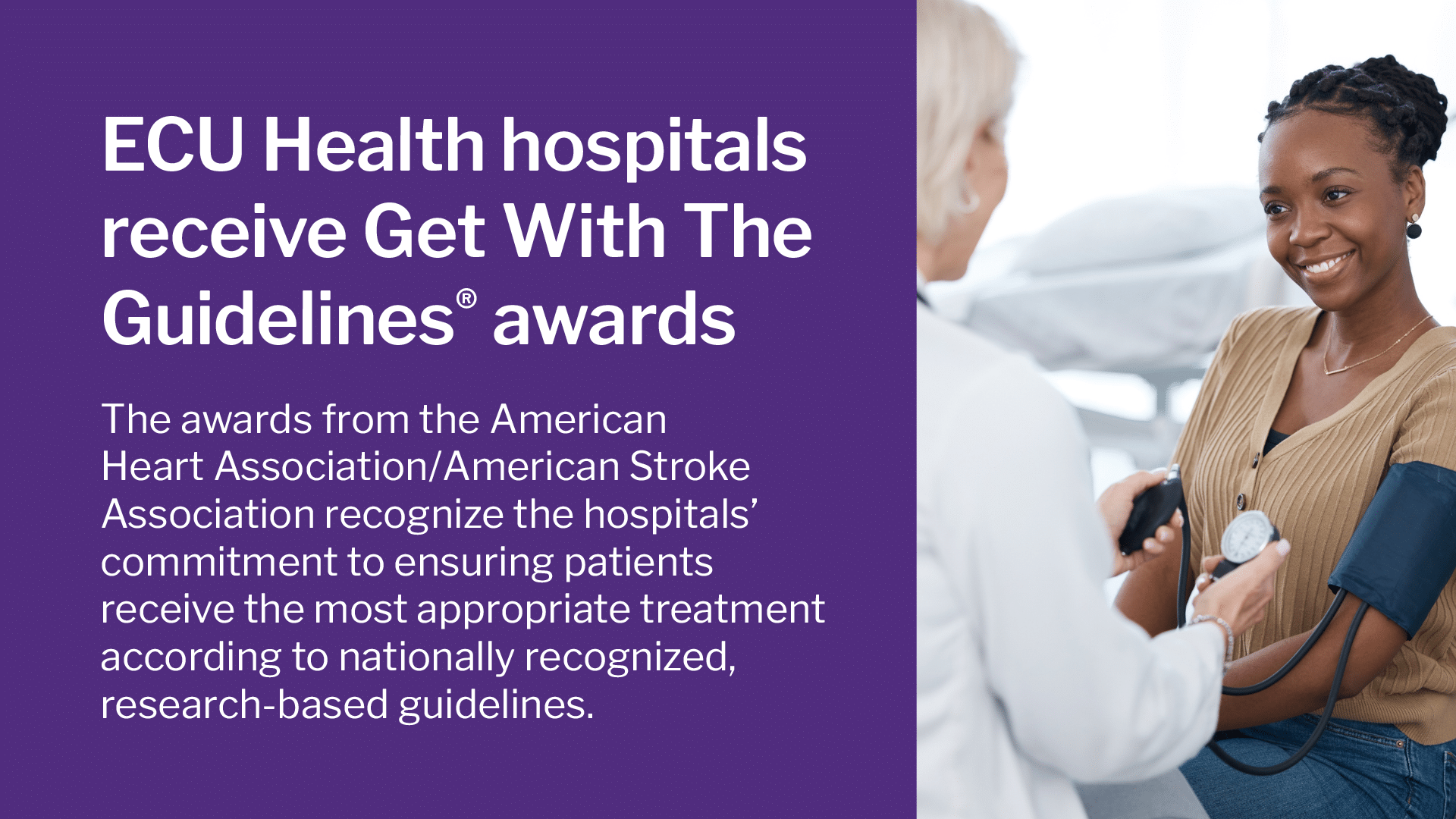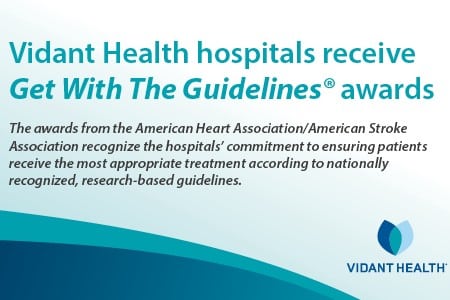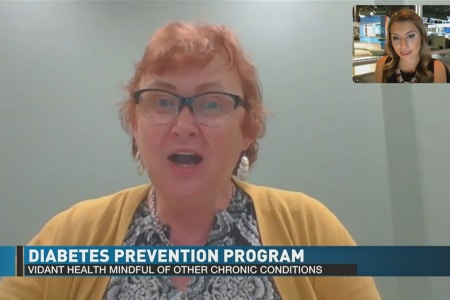Greenville, N.C. – The American Heart Association/American Stroke Association has awarded all nine ECU Health hospitals Get With the Guidelines® achievement awards for their work in treating stroke, diabetes, cardiac arrest, heart attack and heart failure. These awards recognize the health system’s commitment to following up-to-date, research-based guidelines for the treatment of heart disease, diabetes and stroke, ultimately leading to more lives saved, shorter recovery times and fewer readmissions to the hospital.
“ECU Health is honored to receive national recognition from the American Heart Association for our unwavering commitment to providing top-tier care to eastern North Carolina,” said Teresa Anderson, PhD, RN, NE-BC, senior vice president of quality at ECU Health. “These achievements reflect the dedication and expertise of our teams who work tirelessly every day to deliver the best possible care to our patients across the health system. By adhering to the latest research-based guidelines, we are not only improving patient outcomes but also advancing our mission to improve the health and well-being of the communities we serve.”
ECU Health recognitions include:

ECU Health Beaufort Hospital – A Campus of ECU Health Medical Center
- Get With the Guidelines – Stroke Gold Plus with Target: Type 2 Diabetes Honor Roll
- Get With the Guidelines – Coronary Artery Disease Rural STEMI Silver
- Get With the Guidelines – Stroke Rural Silver
- Get With the Guidelines – Stroke Rural Bronze
ECU Health Bertie Hospital
- Get With the Guidelines – Coronary Artery Disease Rural STEMI Bronze
ECU Health Chowan Hospital
- Get With the Guidelines – Coronary Artery Disease Rural STEMI Silver
ECU Health Duplin Hospital
- Get With the Guidelines – Coronary Artery Disease Rural STEMI Silver
- Get With the Guidelines – Stroke Gold Plus with Target: Type 2 Diabetes Honor Roll
- Get With the Guidelines – Stroke Rural Silver
- Get With the Guidelines – Stroke Rural Bronze
ECU Health Edgecombe Hospital
- Get With the Guidelines – Coronary Artery Disease STEMI Referring Center Bronze
- Get With the Guidelines – Stroke Rural Bronze
- Get With the Guidelines – Stroke Gold Plus with Target: Type 2 Diabetes Honor Roll
ECU Health Medical Center
- Get With the Guidelines – Resuscitation Gold Neonate/Infant
- Get With the Guidelines – Resuscitation Gold Pediatric
- Get With the Guidelines – Resuscitation Bronze Newly Born
- Get With the Guidelines – Stroke Gold Plus with Target: Stroke Honor Roll Elite Plus, Target: Stroke Advanced Therapy and Target: Type 2 Diabetes Honor Roll
- Get With the Guidelines – Coronary Artery Disease STEMI Receiving Center Gold with Target: Type 2 Diabetes Honor Roll
- Get With the Guidelines – Coronary Artery Disease NSTEMI Gold with Target: Type 2 Diabetes Honor Roll
ECU Health North Hospital
- Get With the Guidelines – Stroke Gold Plus with Target: Type 2 Diabetes Honor Roll
- Get With the Guidelines – Coronary Artery Disease STEMI Rural Silver
- Get With the Guidelines – Stroke Rural Bronze
ECU Health Roanoke-Chowan Hospital
- Get With the Guidelines – Coronary Artery Disease Rural STEMI Silver
- Get With the Guidelines – Stroke Rural Silver
- Get With the Guidelines – Stroke Rural Bronze
Outer Banks Health Hospital
- Get With the Guidelines – Stroke Gold Plus
- Get With the Guidelines – Stroke Rural Silver
- Get With the Guidelines – Stroke Rural Bronze
“Providing high-quality care close to home is essential, especially in regions like eastern North Carolina, where rates of stroke, diabetes and heart disease are significantly higher,” said Dr. Niti Armistead, chief quality officer at ECU Health. “Having access to specialized treatment and adhering to evidence-based guidelines locally ensures that patients receive the best possible care without the added stress of traveling long distances, which can make a critical difference in recovery and overall health outcomes. Get With the Guidelines programs align with our mission of improving the health and well-being of eastern North Carolina by putting proven knowledge and guidelines to work on a daily basis. Patients across our region can take heart knowing that all our hospitals are available to provide them with exceptional care.”
According to the American Heart Association/American Stroke Association, cardiovascular disease and stroke are the leading and fifth leading causes of death in the United States, respectively. On average, someone in the U.S. experiences a stroke every 40 seconds, with nearly 795,000 new or recurrent strokes occurring annually. Stroke claims approximately 140,000 lives each year, accounting for one out of every twenty deaths. The stroke death rate is even higher in eastern North Carolina, underscoring the critical need for preventive measures and rapid treatment. The state also faces a higher prevalence of diabetes and cardiovascular disease. Research indicates that patients experience better recovery outcomes when health care providers consistently adhere to treatment guidelines and programs like Get With the Guidelines.
“These awards show ECU Health’s commitment to caring for those in their community who need cardiovascular care,” said Donald Lloyd-Jones, chair of the American Heart Association Quality Oversight Committee and chair of the Department of Preventive Medicine at Northwestern Medicine. “By following the American Heart Association’s quality improvement protocols, ECU Health can help realize our shared vision of improved patient outcomes, fewer readmissions and lower mortality rates – a win for health care systems, families and communities.”
 Greenville, N.C. – October 11, 2021– Vidant Health hospitals have received several American Heart Association/American Stroke Association Get With The Guidelines® achievement awards for their work in treating stroke, diabetes, cardiac arrest, heart attack, and heart failure.
Greenville, N.C. – October 11, 2021– Vidant Health hospitals have received several American Heart Association/American Stroke Association Get With The Guidelines® achievement awards for their work in treating stroke, diabetes, cardiac arrest, heart attack, and heart failure.
These awards recognize the hospital’s commitment to ensuring patients receive the most appropriate treatment according to nationally recognized, research-based guidelines based on the latest scientific evidence.
“Vidant’s recognition by Get With The Guidelines® demonstrates our commitment to quality care. Meeting our mission to improve the health and well-being of eastern North Carolina means finding solutions for chronic conditions that affect so many in our region, “ said Teresa Anderson, PhD, RN, NE-BC, senior vice president of quality at Vidant. “The Vidant system is proud to be recognized by the American Heart Association for turning guidelines into lifelines.”
Vidant Health hospitals receiving recognition include:
Vidant Beaufort Hospital, a campus of ECU Health Medical Center — Stroke Gold Plus and Target Type 2 Diabetes Honor Roll
Vidant Chowan Hospital — Stroke Gold Plus and Target Type 2 Diabetes Honor Roll
Vidant Duplin Hospital — Stroke Silver Plus and Target Type 2 Diabetes Honor Roll
Vidant Edgecombe Hospital — Stroke Gold Plus and Target Type 2 Diabetes Honor Roll
ECU Health Medical Center — Stroke Gold Plus and Target Stroke Elite Plus Honor Roll, Target Type 2 Diabetes Honor Roll, Mission: Lifeline Award: Gold Receiving, and Mission: Lifeline NSTEMI: Gold
Vidant North Hospital — Stroke Silver Plus and Target Type 2 Diabetes Honor Roll
Vidant Roanoke-Chowan Hospital — Stroke Gold Plus, Target Stroke Honor Roll and Target Type 2, and Diabetes Honor Roll
The Outer Banks Hospital — Stroke Gold Plus and Target Stroke Honor Roll Elite
“We are pleased to recognize Vidant Health for their commitment to diabetes, stroke and heart care,” said Lee H. Schwamm, M.D., national chairperson of the American Heart Association’s Quality Oversight Committee and executive vice chair of neurology, director of Acute Stroke Services, Massachusetts General Hospital, Boston, Massachusetts. “Research has shown that hospitals adhering to clinical measures through the Get With The Guidelines® quality improvement initiative can often see fewer readmissions and lower mortality rates.”
Stroke, diabetes and cardiovascular disease, which includes heart failure, heart attack and cardiac arrest, are among the leading causes of death in the nation. Cardiovascular disease claims more lives each year than all forms of cancer and chronic lower respiratory disease combined.
According to the American Heart Association/American Stroke Association, stroke is the No. 5 cause of death and a leading cause of adult disability in the United States. On average, someone in the United States suffers a stroke every 40 seconds and there are nearly 795,000 new or recurrent strokes each year. Stroke kills about 140,000 Americans each year, accounting for one out of every twenty deaths. In eastern North Carolina, the stroke death rate is even higher, highlighting the need for preventative and rapid care.
“These awards are another proud moment for the Vidant Health system as it earns the recognition from AHA/ASA for providing the highest level of stroke care through its network of acute stroke ready hospitals, primary stroke centers and a comprehensive stroke center,” said Dr. Shailesh Male, stroke medical director at VMC. “This honor is a testament towards Vidant’s commitment to improve the health and well-being of eastern North Carolina.”
To speak with a Vidant neurologist for non-emergency care, please call 252-816-9700.
To find a heart and vascular provider, please visit Vidanthealth.com/Find-A-Doctor
Type 1 diabetes results when a person’s body cannot produce insulin, the hormone needed to regulate blood sugar levels, and you have to receive insulin injections. Type 2 diabetes occurs when your pancreas works, but not as well as it should. Lack of exercise and eating too many carbohydrates can affect insulin levels and contribute to Type 2 diabetes. Prediabetes is a signal to make lifestyle changes before becoming type 2 diabetes.
The best steps to take in your journey to control blood sugar levels include healthier eating, physical activity, stress reduction and coping skills, all of which are important in diabetes prevention, according to Vidant Lifestyle Nurse Specialist Susan Houston.
Houston said, “One of the most important steps or changes someone who is facing diabetes can make is to accept this status and start a plan to embrace a new, healthier lifestyle.” One of the first steps is to monitor your blood sugar levels. Knowing these numbers will help gauge how well a person is maintaining a healthy blood sugar level. Another key step is making changes in diet and exercise. Watching carbohydrate intake and portion size will make an impact on glucose levels as will moving your body more.
Houston said, “Holiday eating can be a tricky time for diabetics, but there are some simple techniques to help with the food temptations this season.” She suggests using a smaller plate and not going back for seconds and placing a teaspoon in your macaroni and cheese and sweet potato casserole. Use the big serving spoons for the vegetables like green beans, Brussel sprouts and salads; foods that would be lower in carbohydrates. And for dessert, cut the pies and cakes into smaller pieces to help with calorie consumption.
For more information about diabetes prevention information, contact Susan Houston at 252-847-1436.
Susan Houston, lifestyle nurse specialist at Vidant, joined WITN for Healthy Habits segment Tuesday morning to discuss prevention of Type 2 diabetes and an upcoming Diabetes Prevention Program. She said it comes down to small changes we can makes each day, an improved diet and more exercise.
“The main two things would be moving a little bit more, 150 minutes per week is the bare minimum that we should be aiming for to help prevent or delay Type 2 diabetes,” Houston said. “Paying attention to the foods and drinks that we choose, because it’s all about choice, trying to limit carbohydrates. If there’s one thing with drinks you could avoid, it’s drinks that are heavy in the carbs and calories.”
Houston said another piece to avoiding Type 2 diabetes is taking care of your emotional well-being. During COVID-19, we know that anxiety and other mental health challenges can be exacerbated. These can affect how our bodies deal with sugar. Keeping tabs on your mental health is important in so many ways, including your risk of developing Type 2 diabetes.
Another important health habit is getting enough good sleep, Houston said.
“If we don’t have good sleep hygiene, that also can impact our internal stuff,” Houston said. “The stuff we don’t see is the stuff that’s really sneaky for Type 2 diabetes.”
Vidant Health is offering a free year-long Diabetes Prevention Program, and it is all about lifestyle changes each of us can make to help prevent Type 2 diabetes. The virtual program begins on August 27 and September 10 and is open to eligible participants who are at risk for developing Type 2 diabetes.
If you answer yes to five or more of the below questions, you are eligible for the free program:
- Are you over 40?
- Are you male?
- Are you a female with gestational diabetes?
- Do you have a parent with diabetes?
- Do you have high blood pressure?
- Are you physically inactive?
- Are you overweight?
If you are interested in the program, please call 252-847-5590 to be connected with a wellness navigator or visit TINY.CC/VIDANTDPP for more information and to inquire about the program.


